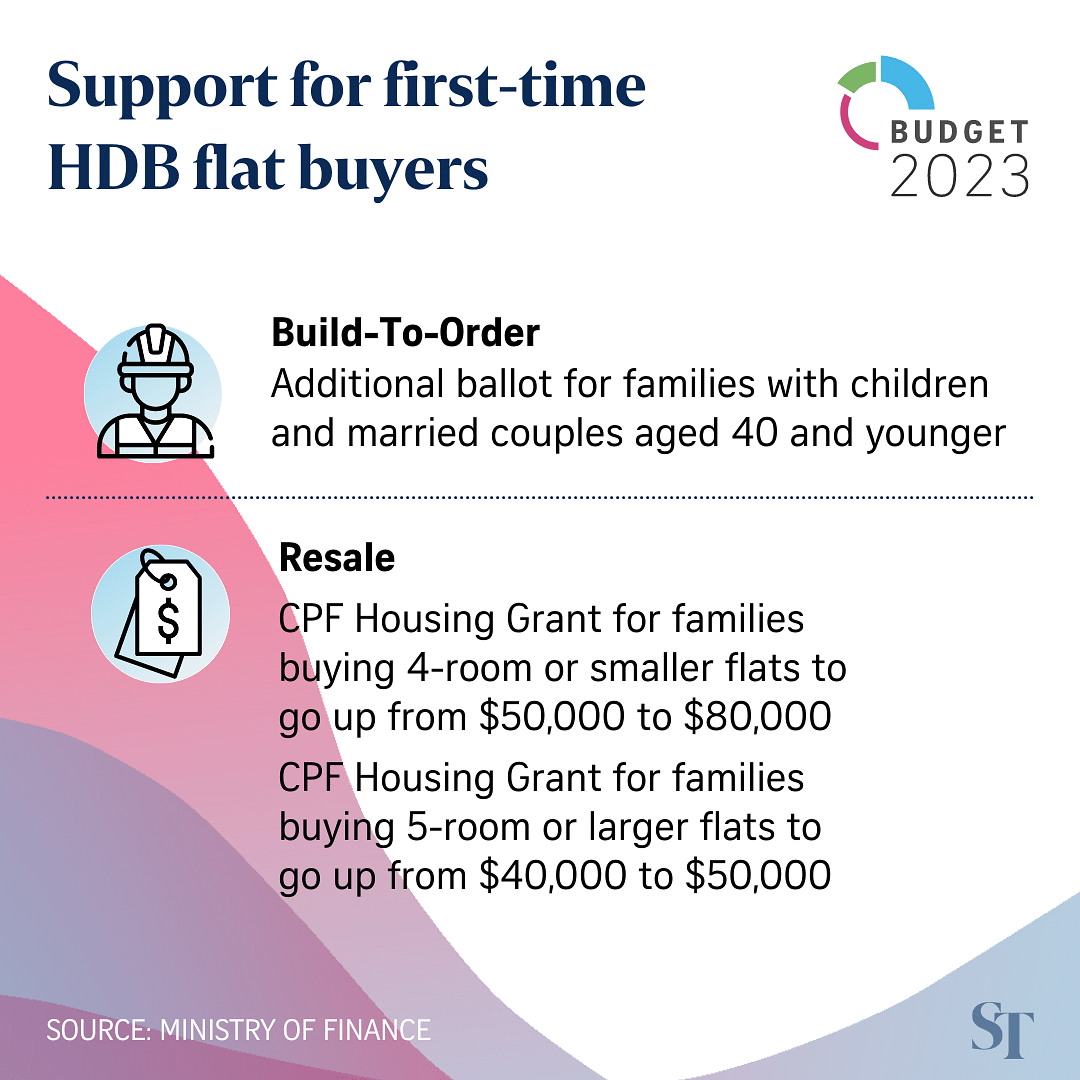www.straitstimes.com

Michelle Ng
Housing Correspondent
UPDATED
9 HOURS AGO
SINGAPORE - The higher housing grant announced during Budget 2023 could raise Housing Board resale flat prices for smaller flats in popular locations, said property analysts.
They expect the revised Central Provident Fund Housing Grant, which has increased by up to $30,000, to shift some demand to the HDB resale market, especially for four-room and smaller flats in mature or sought-after locations, as this group of buyers will receive the most grants. Sellers could take the chance to raise prices, they added.
On Thursday, the Ministry of National Development (MND) said it is “mindful of the potential impact of increasing grants in a buoyant resale market”.
That is why the increased grants are specifically targeted at eligible first-timer home buyers with household monthly incomes below $14,000 for families and $7,000 for singles, and do not go to all buyers, said MND in response to queries.
About a third of resale flat buyers received the CPF Housing Grant in the last two years, it noted, adding that it will closely monitor the market and act decisively if needed.
Deputy Prime Minister and Finance Minister Lawrence Wong on Tuesday announced an increase of between $5,000 and $30,000 in the CPF Housing Grant for first-timer families and singles buying HDB resale flats.
First-timer families buying two- to four-room HDB resale flats can now get a grant of up to $80,000, up from $50,000. Those who buy five-room or larger units can get $50,000, up from $40,000. Singles, meanwhile, can get up to $40,000 for four-room and smaller units, up from $25,000. Those who buy five-room units can get $25,000, up from $20,000.
This means that buyers can either opt to take a smaller loan and reduce their monthly mortgage payments, or cast their net wider for a resale flat as they have an increased budget.
 OrangeTee & Tie senior vice-president of research and analytics Christine Sun said some sellers of four-room and smaller HDB resale units may take the opportunity to raise prices, in anticipation of buyers having greater purchasing power.
OrangeTee & Tie senior vice-president of research and analytics Christine Sun said some sellers of four-room and smaller HDB resale units may take the opportunity to raise prices, in anticipation of buyers having greater purchasing power.
Dr Tan Tee Khoon, Singapore country manager of PropertyGuru, also expects demand for four-room and smaller HDB resale flats to increase in the short term due to first-timer buyers.
But analysts noted that some buyers may not bite if sellers price the increased grant in their asking price.
Ms Sun said sellers should be mindful that buyers face increasing cost pressures on other fronts. The ramp up in Build-To-Order flat supply by HDB could also dilute demand for resale flats, she noted.
MND said sellers who raise their asking prices “might run the risk of pricing themselves out of the market as buyers remain price-conscious, given the high interest rates and uncertainties in the global economy”.
Professor Sing Tien Foo, the provost’s chair professor of real estate at the National University of Singapore, said the grant cannot be used to offset any increase in prices above a flat’s market valuation, as it is credited into the buyer’s CPF account.
“Since the grant cannot be used to pay for the cash-over-valuation (COV) caused by the seller raising the price above valuation, sellers cannot increase prices indiscriminately to cream off the additional grant,” he added.
COV refers to the difference between the sale price of a resale flat and its actual HDB valuation, which can be paid for only in cash.
What the revised grant offers buyers is the flexibility to choose between a BTO flat and the HDB resale market, Prof Sing said.
PropNex Realty chief executive Ismail Gafoor said the higher grant will benefit many families, and ease anxieties over housing affordability to some extent.
Singapore University of Social Sciences associate professor of economics Walter Theseira said that while a grant is meant to primarily benefit buyers, sellers also tend to indirectly benefit.
The main challenge the authorities face in tackling housing affordability is how to intervene in the HDB resale market without affecting the fundamental policy that owners own their flats and are entitled to sell them at market price, he added.
Interventions such as price control would affect this principle and affect the vast majority of Singaporeans who own HDB flats, he said.
Noting that many buyers would prefer to exhaust all their options of getting a prime BTO flat before they turn to a city fringe location or the more expensive resale market, Prof Theseira said a solution is to lessen the “relative attractiveness difference” between prime BTO flats and all other available options.
This can be done through a combination of increasing subsidies given for BTO flats that are not in prime locations and by increasing the clawback for prime BTO flats, which is what is currently implemented through the prime location public housing (PLH) model.
“The basic idea is that the profit potential or implicit value of securing the HDB flat really has to be more similar across locations in Singapore. If it is not, then you will always have this issue,” he said.
Analysts say increased grant could raise HDB resale prices; Govt to monitor potential impact

Michelle Ng
Housing Correspondent
UPDATED
9 HOURS AGO
SINGAPORE - The higher housing grant announced during Budget 2023 could raise Housing Board resale flat prices for smaller flats in popular locations, said property analysts.
They expect the revised Central Provident Fund Housing Grant, which has increased by up to $30,000, to shift some demand to the HDB resale market, especially for four-room and smaller flats in mature or sought-after locations, as this group of buyers will receive the most grants. Sellers could take the chance to raise prices, they added.
On Thursday, the Ministry of National Development (MND) said it is “mindful of the potential impact of increasing grants in a buoyant resale market”.
That is why the increased grants are specifically targeted at eligible first-timer home buyers with household monthly incomes below $14,000 for families and $7,000 for singles, and do not go to all buyers, said MND in response to queries.
About a third of resale flat buyers received the CPF Housing Grant in the last two years, it noted, adding that it will closely monitor the market and act decisively if needed.
Deputy Prime Minister and Finance Minister Lawrence Wong on Tuesday announced an increase of between $5,000 and $30,000 in the CPF Housing Grant for first-timer families and singles buying HDB resale flats.
First-timer families buying two- to four-room HDB resale flats can now get a grant of up to $80,000, up from $50,000. Those who buy five-room or larger units can get $50,000, up from $40,000. Singles, meanwhile, can get up to $40,000 for four-room and smaller units, up from $25,000. Those who buy five-room units can get $25,000, up from $20,000.
This means that buyers can either opt to take a smaller loan and reduce their monthly mortgage payments, or cast their net wider for a resale flat as they have an increased budget.

Dr Tan Tee Khoon, Singapore country manager of PropertyGuru, also expects demand for four-room and smaller HDB resale flats to increase in the short term due to first-timer buyers.
But analysts noted that some buyers may not bite if sellers price the increased grant in their asking price.
Ms Sun said sellers should be mindful that buyers face increasing cost pressures on other fronts. The ramp up in Build-To-Order flat supply by HDB could also dilute demand for resale flats, she noted.
MND said sellers who raise their asking prices “might run the risk of pricing themselves out of the market as buyers remain price-conscious, given the high interest rates and uncertainties in the global economy”.
Professor Sing Tien Foo, the provost’s chair professor of real estate at the National University of Singapore, said the grant cannot be used to offset any increase in prices above a flat’s market valuation, as it is credited into the buyer’s CPF account.
“Since the grant cannot be used to pay for the cash-over-valuation (COV) caused by the seller raising the price above valuation, sellers cannot increase prices indiscriminately to cream off the additional grant,” he added.
COV refers to the difference between the sale price of a resale flat and its actual HDB valuation, which can be paid for only in cash.
What the revised grant offers buyers is the flexibility to choose between a BTO flat and the HDB resale market, Prof Sing said.
PropNex Realty chief executive Ismail Gafoor said the higher grant will benefit many families, and ease anxieties over housing affordability to some extent.
Singapore University of Social Sciences associate professor of economics Walter Theseira said that while a grant is meant to primarily benefit buyers, sellers also tend to indirectly benefit.
The main challenge the authorities face in tackling housing affordability is how to intervene in the HDB resale market without affecting the fundamental policy that owners own their flats and are entitled to sell them at market price, he added.
Interventions such as price control would affect this principle and affect the vast majority of Singaporeans who own HDB flats, he said.
Noting that many buyers would prefer to exhaust all their options of getting a prime BTO flat before they turn to a city fringe location or the more expensive resale market, Prof Theseira said a solution is to lessen the “relative attractiveness difference” between prime BTO flats and all other available options.
This can be done through a combination of increasing subsidies given for BTO flats that are not in prime locations and by increasing the clawback for prime BTO flats, which is what is currently implemented through the prime location public housing (PLH) model.
“The basic idea is that the profit potential or implicit value of securing the HDB flat really has to be more similar across locations in Singapore. If it is not, then you will always have this issue,” he said.
